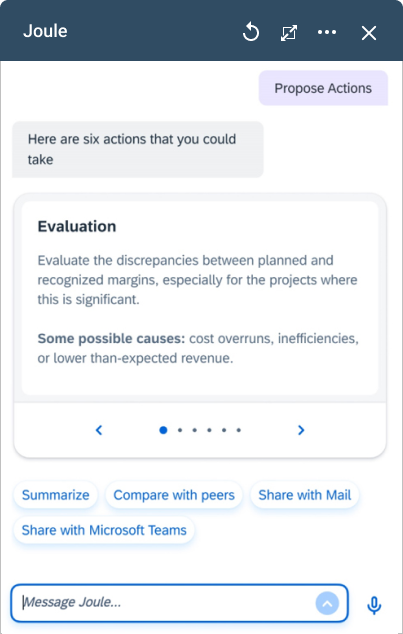Supply Chain Management AI Solutions
See how you can benefit from AI built into your core business processes — enhancing logistics, demand forecasting, inventory management, procurement, supplier collaboration, production planning, and distribution within Supply Chain Management.

Powering Businesses to Lead in Smart World with Joule Copilot!
SAP offers several AI-powered tools and solutions to enhance supply chain management. Here’s how you can leverage SAP AI specifically to optimize various areas within the supply chain:
1. Demand Forecasting and Planning
SAP Integrated Business Planning (IBP): This platform leverages machine learning algorithms to predict demand more accurately. It uses historical sales data, seasonal trends, and external data to refine forecasts, improving demand planning across the supply chain.
Demand-Driven Replenishment: SAP AI automates stock level planning based on demand forecasts, reducing both stockouts and excess inventory.
2. Inventory and Warehouse Management
SAP Extended Warehouse Management (EWM): SAP EWM uses AI to optimize warehousing operations, including receiving, storage, and retrieval. AI-driven predictive analytics can anticipate inventory needs and help manage warehouse resources efficiently.
Stock and Inventory Optimization: SAP’s AI can help calculate optimal stock levels and safety stocks by analyzing lead times, demand variability, and other factors, keeping inventory levels balanced.
3. Logistics and Transportation Optimization
SAP Transportation Management (TM): This module uses AI to find optimal delivery routes by considering factors like weather, traffic, fuel costs, and delivery deadlines. Route optimization improves delivery speed and reduces transportation costs.
Real-Time Visibility: SAP’s AI-driven analytics and IoT integration provide real-time tracking for shipments, offering updates on location, estimated arrival times, and any potential delays. This improves logistics transparency and customer satisfaction.
4. Supplier Management and Risk Assessment
SAP Ariba: This module uses AI for supplier management, risk assessment, and procurement. AI algorithms evaluate supplier performance based on data like delivery times, quality, and pricing, and can provide recommendations for supplier selection.
Risk Identification and Mitigation: : AI in SAP Ariba assesses supply chain risks by analyzing data on supplier financial health, geopolitical events, and other external factors, helping companies anticipate and mitigate risks.
5. Quality Control and Predictive Maintenance
SAP Predictive Maintenance and Service: Using machine learning, SAP can analyze sensor data from equipment and predict when maintenance is needed. This reduces unplanned downtime, optimizes maintenance schedules, and extends asset lifespan.
Quality Inspection: AI-driven image recognition and analysis in SAP can detect product defects during production or before dispatch, ensuring quality control without relying solely on human inspection.
6. Order Fulfillment and Customer Service
SAP Service Cloud: SAP’s AI-driven Service Cloud offers chatbots and virtual assistants that can assist with order tracking, delivery inquiries, and handling customer requests, enhancing the customer experience.
Automated Order Processing:AI algorithms can automate parts of the order fulfillment process, such as verifying orders, confirming inventory, and preparing for shipping, making order processing faster and more accurate.
7. Sustainable Supply Chain Management
SAP Product Footprint Management: This tool allows companies to calculate and report on carbon footprints across the supply chain. SAP AI can optimize processes to reduce emissions, support sustainability goals, and meet regulatory compliance.
Circular Economy and Reverse Logistics: : SAP can facilitate reverse logistics (returns and recycling) using AI to streamline product returns and enable companies to reuse, recycle, or responsibly dispose of products.
8. Data-Driven Decision-Making and Insights
SAP Analytics Cloud (SAC): This AI-powered analytics platform enables supply chain teams to gain insights by visualizing data, identifying trends, and running what-if scenarios. SAC provides predictive insights to help make informed, data-driven decisions.
Scenario Simulation: : SAP AI can run scenario-based simulations that allow companies to predict supply chain outcomes under various conditions, helping teams make resilient plans.
Implementation Tips for Using SAP AI in Supply Chain
Define Clear Objectives: Start with specific goals (e.g., reducing stockouts, improving forecast accuracy) to focus SAP AI implementations on high-impact areas.
Invest in Data Quality and Integration: SAP AI relies heavily on accurate and comprehensive data. Ensure data from different sources (ERP, warehouse, transportation) is clean and integrated into SAP systems.
Leverage SAP’s Machine Learning Tools: SAP’s AI functionality includes machine learning algorithms that can be customized for specific supply chain processes.
Continuously Monitor and Adjust: AI models need periodic monitoring and adjustments to stay accurate as new data flows in and business conditions change.
Benefits of Using SAP AI in SCM
By using SAP’s AI-driven solutions in SCM, companies can:
* Enhances the visibility across the entire supply chain.
* Improve demand planning and inventory optimization.
* Minimize operational risks and improve supplier performance.
* Reduce waste and support sustainability goals.
* Increase responsiveness to customer needs and market shifts.
Integrating SAP AI within supply chain operations can drive agility, efficiency, and resilience, giving companies a competitive edge in the market. Let Specific Conditions help you implement SAP AI solutions across your enterprise.
